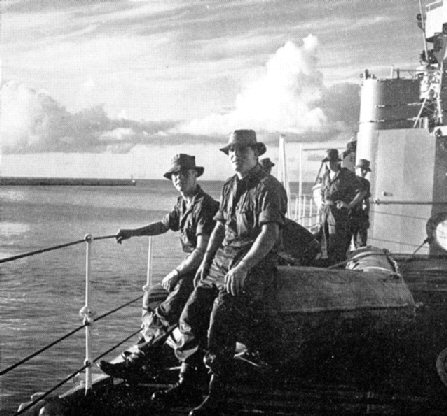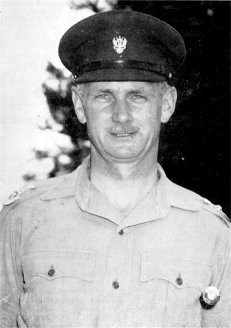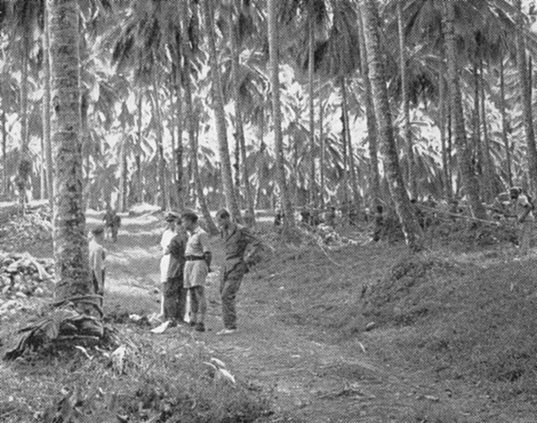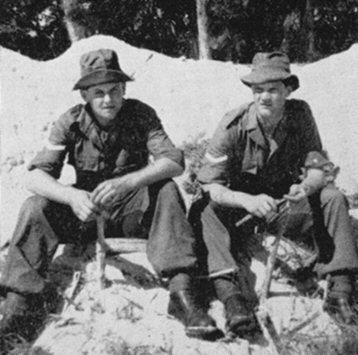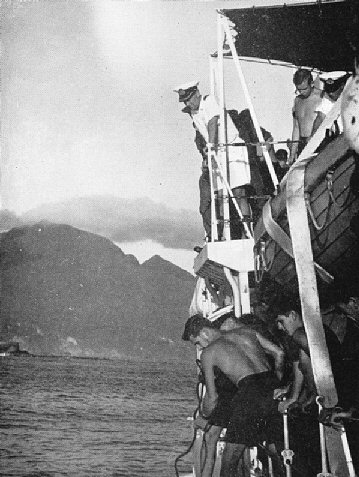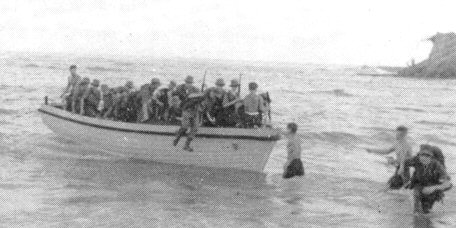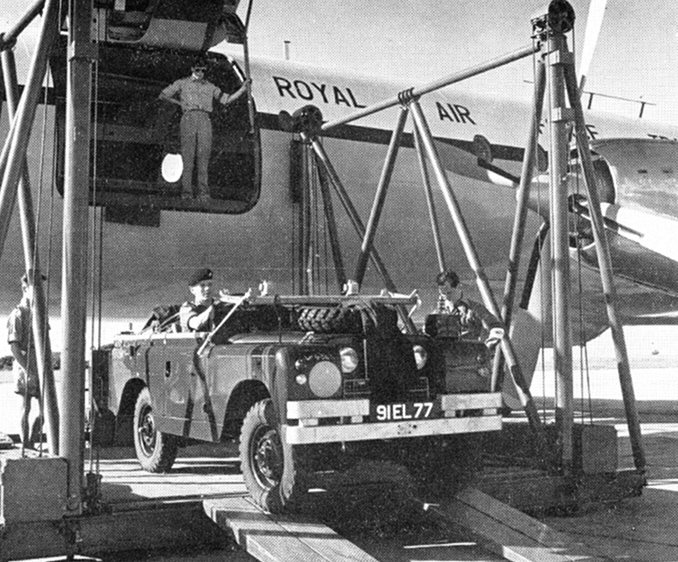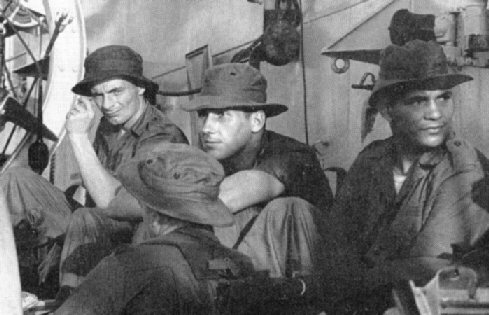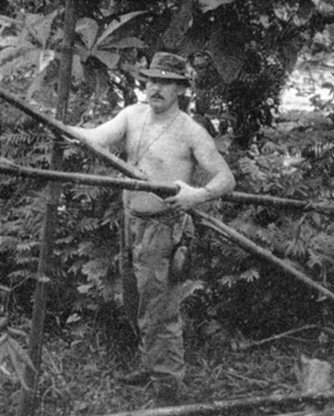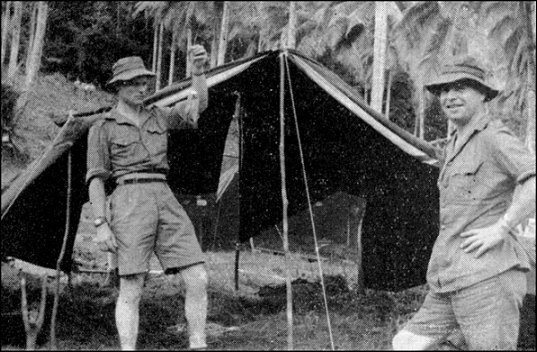1st Battalion Worcestershire Regiment - Dominica 1964
EXERCISE "RUM JUNGLE"
On Friday 30th October 1964, 300 officers and men of the 1st Battalion Worcestershire Regiment under the Command of Lieut.-Col. E. L. Trotter, MC., assembled at Lee Metford Camp. Lydd, for a move which was to take them eventually to Dominica in the West Indies, By mid-day on 30th October, the force had moved by M.T. to R.A.F. Manston, Kent, and thence by Beverley Aircraft to R.A.F. Pershore in Worcestershire. This was followed by a move in coaches to Norton Barracks, Worcester.
Saturday the 31st October 1964, was the fiftieth anniversary of the Battle of Gheluvelt. The 1st Battalion joined with the 7th Battalion The Worcestershire Regiment (T.A.) and Old Comrades of the Regiment to exercise their privilege of marching through the City of Worcester with Colours flying, drums beating and bayonets fixed, to commemorate this great 1914 Regimental Battle Honour.
On Monday 2nd November, the 1st Battalion reassembled at Norton Barracks after a short weekend leave and travelled to M.C.C.P. at Devizes in Wiltshire. During Tuesday 3rd November, Battalion H.Q., H.Q. Company and two Rifle Companies, an R.E. Postal detachment and two medical officers from 3rd Division flew from Lyneham to Barbados via Newfoundland and Bermuda in R.A.F. Brittanias of Transport Command. Included in this lift were four F.F.R. Landrovers and 10 tons of freight which were to sustain the Battalion for the next month until their return to England in early December.
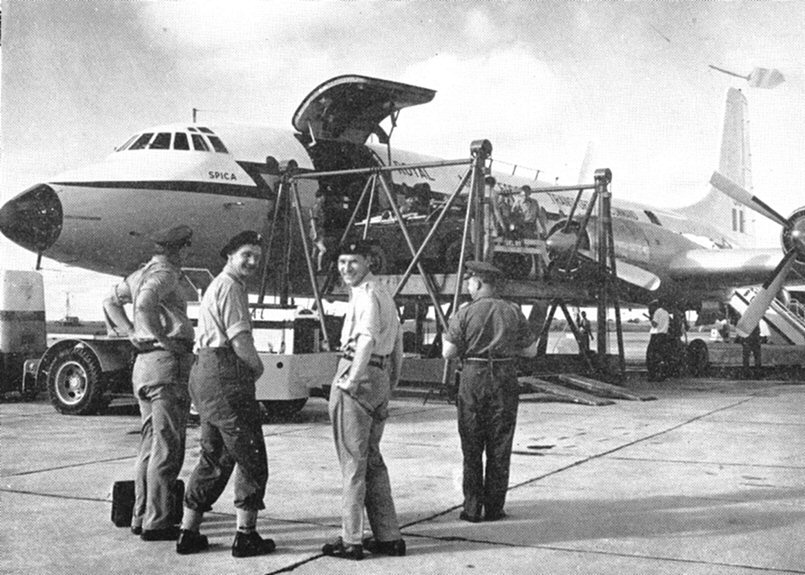
Commanding Officer Lieut.-Col. E. L. Trotter, M.C. and Major A. M. Gabb watching the unloading at Barbados
The Battalion and its stores arrived at Sea-Well Airfield, Barbados, on Wednesday, 3rd November, at two hourly intervals. After a quick change from Combat kit to swimming trunks the men enjoyed their first swim in the Caribbean before donning their Olive Green uniform in preparation for the next phase of the operation. The Battalion embarked on H.M.S. "Decoy" at Bridgetown harbour and sailed at 5.0 p.m. that evening. During the night the destroyer presented a strange sight as her decks were piled with Landrovers, kitbags and stores of every kind. Every remaining inch of deck was covered by sleeping soldiers. It is of interest to note that the Army on board outnumbered the Royal Navy by five!
On the deck of H.M.S. "Decoy" in Bridgetown Harbour, Barbados |
Dawn, the following morning, found H.M.S. "DECOY" lying a mile off the rugged coast of Dominica. Tannoys blared and whistles blew as Battalion Tactical H.Q., The Signals Platoon, two Rifle Companies and a detachment from the ship clambered down the scrambling nets into assault craft from H.M.S. "DECOY" which had been lowered into a fairly heavy swell, which made loading somewhat hazardous. However all went well and in a very short time an assault landing was made on to the palm fringed beach. Within half-an-hour this Force had crossed the reef and moved inland towards Woodford Hill Estate. The Battalion then commenced a 10 miles march through dense primary jungle to prepare a base camp at Governor Estate near the Island's only Airstrip at Melville Hall. Later that day the Battalion stores arrived at the base camp after having been unloaded at Roseau, the capital of Dominica. Within three days the Battalion had built for itself a base camp named "FORT PHILIP" from bamboo, coconut fronds and other types of tropical vegetation. The following week was spent on section jungle training which included live firing. The camp was sited by a fast flowing mountain river which gave plenty of scope for swimming and washing. |
On 16th November, the Battalion was honoured by a visit to "Fort Philip" by H.R.H. The Duke of Edinburgh, who toured the camp and spoke to many of the soldiers.
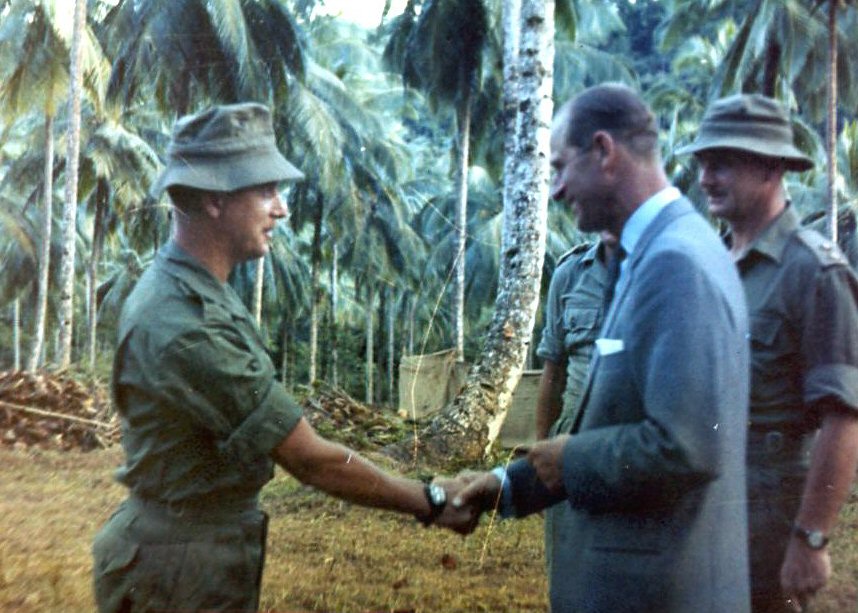
CSM "Footy" Don Cheeseman ('B' Company) meets H.R.H. The Duke of Edinburgh, watching on Lieut.-Col. E. L. Trotter, MC. (right)
(photo supplied by Trevor Baylis who served in 5 Platoon)
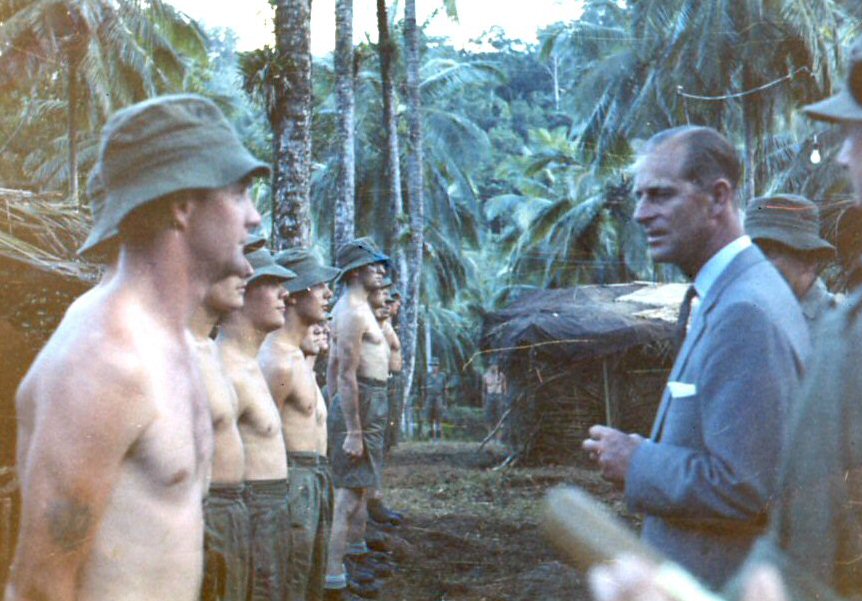
H.R.H. The Duke of Edinburgh chatting to Corporal Dave Johnstone (far left), No 1 Section, 6 Platoon, 'B' Company men
(photo supplied by Trevor Baylis who served in 5 Platoon)
Some of the lighter moments on the Island included a cricket match against a local eleven, a visit to the Carib Reserve and trips to the beach at weekends. A few of the soldiers who came on the exercise to Dominica with the Battalion were born in the Caribbean and have been able to return home for leave for the first time in several years.
In conclusion we finish with a brief description of the island which is the third largest British island in the Caribbean. It is approximately 30 miles long by 15 miles wide and virtually entirely clothed in primary jungle with the exception of banana and coconut plantations and smaller plots yielding citrus fruits.
The island is very mountainous, rising to 4660 ft. with numerous other peaks over 3000 ft. The northern end has a rainfall of over 300 inches per year and the Battalion had its fair share while it was their!
The population is approximately 60000 and of these there are 600 pure Caribs, who have the typical Amerindian features. The main occupation is plantation work, the island economy being largely based on the growing of bananas, citrus fruits, coconuts and coffee.
Exercise "RUM JUNGLE" proved to be an interesting exercise involving the three Services and from the Battalion point of view it gave plenty of scope for operating in difficult mountainous conditions demanding a high degree of physical fitness and personal initiative. The ruggedness of the terrain and unpredictability of the weather was only matched by the natural beauty of the island and the kind and friendly hospitality of its people.
Finally special mention must be made of Mr. and Mrs. Laville, who own Governor Estate. Mr. Laville took great pains to ensure that the Battalion had as many amenities as he could possibly provide. To this end he provided an electric lighting generator with all the accessories, a tractor load of banana stems literally thousands of bananas, and he very frequently arrived with a Landrover full of grapefruit and oranges. Needless to say all his efforts were greatly appreciated by us all.
In recognition of his help and generosity, the Commanding Officer presented him with a silver tankard, suitably inscribed "on behalf of all ranks of the 1st Battalion."
REPORT FROM DOMINICA 22nd November 1964
From Lieut. Colonel E. L. Trotter, M.C., Commanding 1st Bn. The Worcestershire Regiment
It is Sunday afternoon, and dry for a change, so I am taking this opportunity of writing about the happenings of the Regiment since we left Worcester on 2nd November. Our party, under Major Crompton, at Devizes, had spent the Gheluvelt weekend paving the way for our reception and emplanement at Lyneham. The R.A.F. seemed generally well pleased with the presentation of our 10 tons of air freight and vehicles and with the documentation of the various "chalks," five in all, by which we moved to Barbados. The credit for this rested largely with John Crompton, RQMS WOII Jones and ORQMS WOII Kendrick. Thus the Regiment got off to a good start. Major Gabb had left with a small advance party of six, including Paddy Hackett by air for Barbados on the same day that we were marching through Worcester. The R.A.F. routed the flight via British Guiana. Here engine trouble developed and the party became stranded for 48 hours. However, Michael Gabb, by personal effort, managed to get himself to Barbados so that when I arrived on 3rd November with the Paymaster and our four Landrovers. I did not find myself the first member of the Regiment to land in Barbados. Michael had made very thorough, though single handed, arrangements for the reception of the Battalion. His advance party caught him up again the same evening and just in time to receive the Battalion on the following day 4th November. As the first plane load of the main body arrived in Barbados I was taking off with the Paymaster and Angus Nisbet by special charter for Dominica. On arrival we were met by Major Hugh Orpen, Royal Marines, the staff officer responsible for setting the I.S. exercise which was to start our training in Dominica. We did a hasty recce of our planned base camp site in the N.W. of the island and then travelled to Government House, Roseau, the capital, where we were to stay the night and await the arrival of the main body the following day aboard H.M.S. "Decoy," in which they were sailing from Barbados. |
Lieut.-Colonel E. L. Trotter, M.C. |
Last minutes political unrest in the island resulted in the decision to cancel the I.S. exercise. This decision was communicated to me by the Administrator H.H. Lieut.-Col. Alec Lovelace on my arrival and simultaneously Commodore John Ashton, S.N.O., West Indies, at that time aboard H.M.S. "Decoy." The Senior Naval Officer, West Indies, thereupon decided to land the Regiment the following morning over an open beach using ship's boats and for them to then march six miles through jungle to the planned base camp. This meant a change in the location, timing and method of disembarkation from one in the S.E. of the island at Roseau to one in the N.W. of the island at Woodford Hill, 25 miles apart. Unfortunately Hugh Orpen's R.N. radio was not working and the local cable office had closed at 7.0 p.m., thus the change in plan did not become known to the Administrator and myself until 7.30 a.m. the following morning, by which time the Regiment had landed under Michael Gabb at Woodford Hill and had already started the march to the camp. In the meantime half Roseau, press, cadets, Administrator and all had been waiting patiently on the jetty looking out to sea for a sight of "Decoy" since 5.30 a.m. H.H. was not amused I may add, particularly as every vehicle in the island had concentrated at Roseau for duty as troop carriers.
However, in the event it gave a spice of the unexpected to the Battalion, and a thrill for the young soldiers to do a seaborne assault without any previous experience other than assault river crossings in April at Sennelager. "Decoy" then sailed round to Roseau, off loaded the vehicles and stores and H.Q. Company (65) all of which was completed and loaded into civil banana trucks by 3.0 p.m. Administratively it was a mess as the vehicles and stores had to arrive in the dark after a 2-hour drive and be unloaded in a coconut grove with no light. A fall of rain in the night did not help matters and dawn found stores lying all over the place. Fortunately it was a sunny day and we were able to sort things out quickly. After the march to the camp site the men had a swim.
1st Battalion H.Q. site in Dominica - Adjutant Captain E. A. Ireland (on the right) |
The next four days, Monday to Friday, were spent in building our base camp, sited four miles from the sea and airfield, on the verge of the jungle and in a coconut grove, 500 feet above sea level. The site is provided with a good fresh water supply, an all weather track from the sea and wooded hills rising steeply to about 2000 feet on two sides of the valley. Our construction programme, executed in hard wood, bamboo and palm fronds, in addition to a special jungle leaf for roofing, included cookhouse, dining room, messes, Cpls.' Club, Company beer bars and men's bashes, sleeping each a section. Mrs. Frobel Laville, on whose estate we were encamped, was most helpful in the provision of estate labour to assist and advise and in providing transport where this could be used. The men's huts vary from excellent (100% waterproof) to indifferent (50% waterproof); whilst these were under construction we used bivouacs of which we had brought 175, weighing 1 ton of our 10 tons freight. They now cover the roofs of the least well constructed huts and by and large we have a reasonably comfortable set up, although we are hard pressed to compete with an average daily rainfall of about 3 hours. Drainage has also taken up much of our time to avoid the place becoming a morass. |
The next four days were spent in elementary jungle training at section level during which time we had a chance to complete our acclimatisation. Our pre-fitness training at Lydd had served us in very good stead so that we were able to compete fairly easily with the terrain from the outset. Our second weekend was fine and sunny by day and companies took transport to the beach and lunched and swam there most of the day. On the Sunday Michael Gabb, Ted Ireland and myself went to Portsmouth to find the grave of Lord Cathcart, buried there when the 36th visited the island in 1740. Strangely enough the name is incorrectly spelt Cathgart and the date 1771 is also 31 years out. I checked on the details in Burke's before coming out here. This Cathcart was, I think, the grandfather of Earl Cathcart, C.O. of the 29th, 1789-92, and later Colonel of the 29th.
This brings me to the past week which started with the visit on Monday of H.R.H. The Duke of Edinburgh. He landed at Roseau in the morning, a reception and cocktail party was held at Government House at noon to which I and the Company Commanders, 2I.C. and Adjutant. were invited. I remained for luncheon and then drove back quickly to camp, 2 hours, to change and await H.R.H.'s arrival at 4.45 p.m. The men were standing to the bashas, he toured the lines very quickly but spoke to many of the men and then visited the cookhouse down the hill, whilst the men, unseen, lined the route back up through the camp. He left at 5.5 p.m., 5 minutes later than scheduled, driving his own Landrover with myself up front. The men gave him an excellent send-off and I think I can say left a lasting and favourable impression. H.H. The Administrator kindly sent up Prince Philip's Personal Pennant the following day, which I have in safe keeping and will, in due course, send to the Regimental Museum.
The rest of last week was spent by companies in a four-day company jungle camp, four miles in from the base. Much was learnt by all ranks, not least navigation and the need to make a dry bed for the night and keep dry clothing for use at night only.
have been alarmed by the number of accidents with matchettes; at least 30 men have managed to cut themselves in one way or another, none, fortunately, very serious. 300 young Worcestershire lads armed with matchettes would indeed be a formidable foe if not to the enemy then at least to themselves.
Yesterday, Saturday, the Administrator visited the camp informally and thereafter had luncheon and drinks with the officers at a local estate beach hut which we were loaned for the purpose. In addition we had about another sixty guests from the rest of the island, all people who have helped in some way since we came here. They were invited for 1 p.m. and all left by 4.30 p.m. It was a jolly party and worthwhile holding many of the guests were coloured but the island is totally devoid of that bar and most of those in influential positions in Government and commerce are non-European. We asked our own Warrant Officers along as they have missed out on much of the social activity in the island. I must say that they did us great credit, and, I think, enjoyed themselves.
Another week's training lies ahead of us before we start to pack and finally leave Dominica on Tuesday, 1st December, on H.M.S. "Whirlwind" for Barbados. We start arriving back at Lyneham on 3rd/4th December for Lydd.
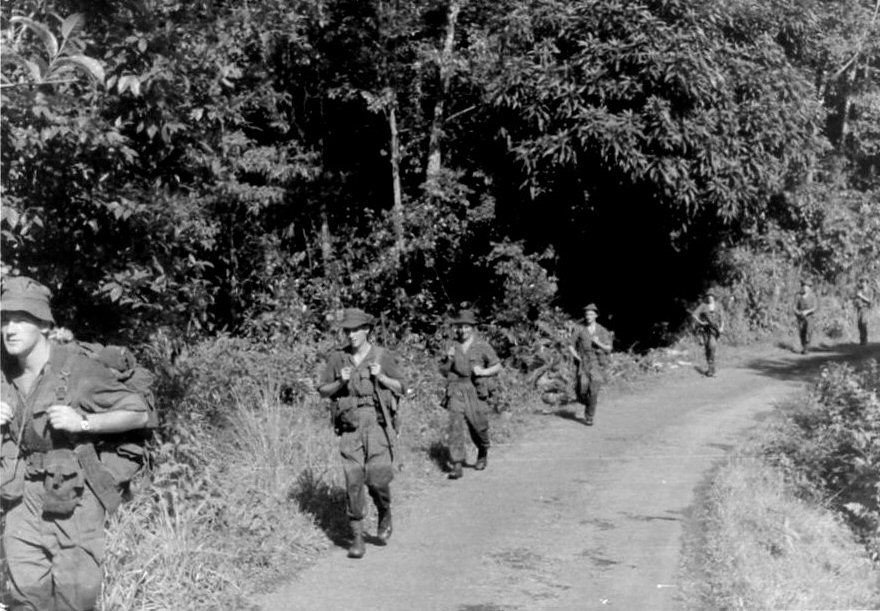
Lieut. Richard Wood (left) leads a patrol
(photo supplied by Trevor Baylis who served in 5 Platoon)
'A' COMPANY NOTES
The highlight of the Company's stay in Dominica were two exercises, of three and a half days duration. spent away from the Base Camp. They were most enjoyable and provided some interesting training on anti-terrorist lines In spite of Mr. Frankie Tongue (a Local Forest Ranger) and his prophecy of dry weather, both periods resulted in heavy rain but this, apart from hindering C/Sgt. Owens' efforts to light a fire with lightly inflammable wood, did not damp our spirits.
For the first camp the whole Company, including the attached 'D' Company, were concentrated in one area near a stream in the hills. Rations were carried in on the men's backs and added to the steepness of the track but with the aid of salt tablets and ample water everyone arrived safely. Two-men huts were built on the first day and the ingenuity of some builders showed that soldiers can be at home anywhere. In fact many started a preference for the forest as their huts were really dry and the only fatigue encountered was from trekking through the hills.
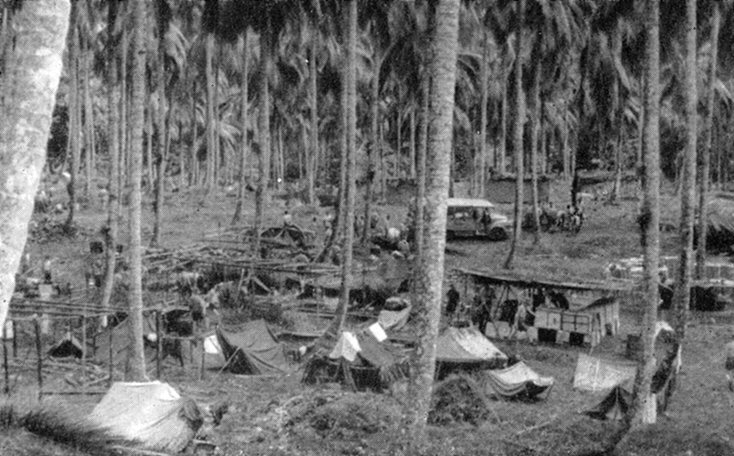
'A' Company Camp under construction
On one day, while platoon commanders were away on recce's for platoon camps, all sections were put through their paces by the O.C., 2i/c, C.S.M. and Lieut. Ramsden. The peace of the forest was shattered by thunderflashes and bursts of fire as sections encountered and fought their way out of ambushes. On the final day, platoons trained close to camp and the Company marched to base in the afternoon. wet, damp and tired, but knowing that it had learned a great deal.
After a weekend of washing, drying out and beach therapy we set off again to occupy the previously sited platoon camps. From these camps platoons operated against each other for one day before concentrating in the old Company camp where the last night in the forest was celebrated by going "non-tactical." Rum Punch appeared as if by magic and beer which had been humped in by H.Q. Company rear details served to lighten the evening. The singing and jokes around the camp fire were boisterous if not subtle and set the tone for the final day's training.
The Company made a long approach march to a 'bandit' camp, the old 'B' Company site, which was attacked successfully. Unfortunately, the return to the lunch R.V. was not quite such a success and most of the Company saw much more of the forest than they intended to see.
Both exercises bought their quota of accidents —mainly cuts and bruises—but during the second exercise, Private Fisher, of 2 Platoon, had a nasty fall and injured his back. The whole platoon carried him on a stretcher for five hours across some extremely difficult country to reach the nearest Landrover track—a very commendable performance.
Now, back in camp, everyone is packing and trying to get clean in readiness for our return to Lydd next week. Dominica has not been the West Indian paradise some of us had expected, but we have learnt to fight under extremely adverse conditions whilst maintaining our efficiency and sense of humour. Finally, we cannot leave this island without mentioning the extreme kindness and honesty of the local people. It is a poor island and workers' wages are pitifully small yet they constantly gave the men gifts of fruit and helped them in many other ways.
'B' COMPANY NOTES
L/Cpl. Holmes and L/Cpl. Taylor on the beach |
Fourteen hours flying and eight meals after the Company Sergeant Major's farewell to 'TRIXIE' we arrived at Barbados, where we embarked on H.M.S. "Decoy" with the rest of the Battalion for Dominica. The ship's crew were very hospitable and the food excellent, though we doubt if Capt. Swainson enjoyed either! The Battalion's landing by ship's boat, via scrambling nets, and the jungle march to the Battalion camp site was led by 'B' Company and despite Private Bennett's fatigue and the C.S.M.'s and Private Curtin's language, the Company all arrived, still in front of the rest of the Battalion. L/Cpl. Moore's section won the Battalion and Company 'Basha' building competition—a close second being Corporal Johnstone's section who, unfortunately, had a power cut, which put their television set out of commission. After about a week of glorious sunshine and platoon training the rain and Company training began. Although the former was continuous the latter was divided (only just for some) into two four-day exercises during which each platoon got lost for at least 18 hours on either Water's water walk, Beard's mystery tour or Perry's Parade; even the O.C. will admit that map reading in Dominica is a little more difficult than BAOR and that without Frank's Company, H.Q. might not have been so lucky — or the O.C. so dry, During our stay in Dominica the Corps of Drums have been attached to 'B' Company and although their bashas were not the best in the Bush and especially on the beach, singsongs. led by 'Tojo' were second to none. |
'B' Company H.Q. for Dominica have been comprised of the following: Major McGahey, Capt. (Canteen) Swainson, Acting C.Q.M.S. Baker, Privates; (Language) Curtin, (Padre) Hemming, C.S.M. (Footy) Cheeseman, C/Sgt. (HE HE) Turberfield, (Nancy) Dutton, (One Arms) Parks and last, but not least. Doctor (Bushman) Tuitt.
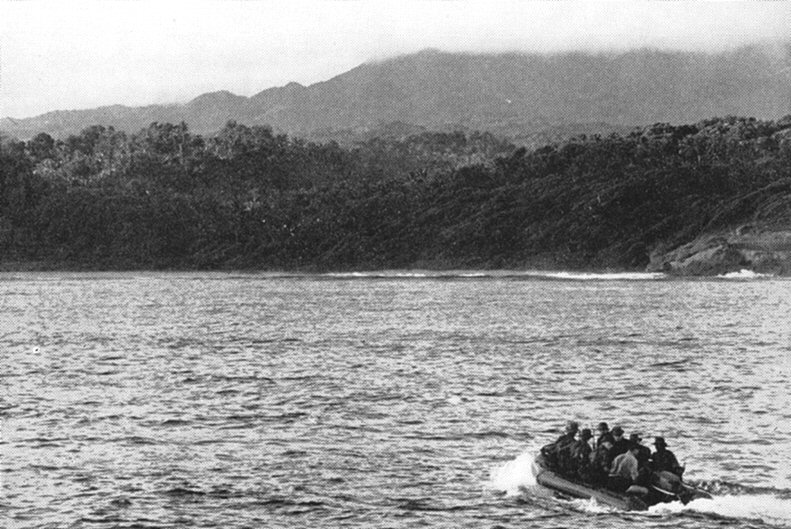
Spearhead of assault approaching Dominican beach at dawn in "Gemini" assault craft
No. 5 Platoon
No. 3 section (The Warriors of the Deep), as they would have it, have already indented for flippers. However, in spite of one or two discomforts I think we have all enjoyed our jungle training in Dominica. The exercise began with an airlift from Lyneham to Barbados. Even on our flight out Sgt. Smith was there with his camera. We are all wondering whether he forgot to put a film in as yet we have seen no results. Our stay in Barbados was brief but we all managed to get to the beach for a swim. From Barbados we sailed in H.M.S. "Decoy" for Dominica where we landed at Woodford Hill Bay, but not before Corporal Baylis and Powell had decided to go for another swim while leaving H.M.S. "Decoy" and boarding the landing craft. No. 5 Platoon were called upon to be the first wave to go in on the Battalion's invasion of Dominica. After our landing, and when the beach had been secured, we moved off cross-country to the Battalion's base camp at Govenor Estate. The next few days were spent in building our bashas. Once the bashas were built we started our jungle training starting with a navigation exercise—those, maps. We also managed to get in a day on the home-made jungle lanes. On Monday, the 16th November, the Battalion was visited by H.R.H. Prince Philip but, unfortunately none of the Platoon were lucky enough to have spoken to him. The day after his visit we all went off to the jungle for four days, or was it five? That chocolate was good. On the next four-day exercise L/Cpl. Brown attempted to fly over a waterfall but, so we were all told, his wings did not open, and Cpl. Baylis just made home in time. The exercises were soon over and back to base camp we all came to pack up. All managed to survive the exercises which was quite a feat considering some of the places we had to pass over. Congratulations to L/Cpl. Cooper whose promotion came through soon after we arrived here. He has now left us for 'D' Company. |
Chief Engineer of H.M.S. "Decoy" lowering boats |
No. 6 Platoon
Dawn broke and there is was, Dominica. Infantrymen heaved themselves over the side into the waiting boats, Oops! Catch that Corporal. The boats pulled away, took up their formation and headed for the shore.
As soon as our boat touched the beach we jumped ashore and made for our first objective. Training here has been tough but, as usual, No. 6 Platoon has managed to overcome its problems.
Our first job here was to build our huts and bashas using the local vegetation. Our interest was increased by the announcement that the Commanding Officer would present a £5 prize for the best effort in the Battalion's Lines. 6 Platoon swept all others aside in this competition and No. 2 Section, under L/Cpl. Moore's management won first prize. No. 1 Section, under Cpl. Johnstone, did very well also and secured a special commendation.
The exercises in the jungle went off well as far as the Platoon was concerned, and we seemed to collect prisoners quite frequently from the enemy, the anti-tank platoon.
Private Westwood has found a new way of playing Russian Roulette. All one needs is a partner and fast flowing river, if this fails try the Westwood snaketail.
In a bottle shooting competition, with its first prize of two crates of beer, we made a special effort to win. At the end of the first day No. 6 Platoon was the only platoon in the Battalion to have more than one team through to the third round of the competition.
Corporal Johnstone's section narrowly defeated L/Cpl. Moore's and he himself lost to Corporal Tysall's team, who were unfortunately knocked out of the competition in the semi-finals, when an over-eager marksman shot too soon, securing their disqualification in favour of the team which later won the competition.
The following are the members of the Platoon at present:—
2nd Lieutt. C. B. Beard, Sergeant Trethewey, Corporals; Wood, Johnstone, Tysall, Lance Corporals; Moore, Clarke, Lawton and Hathaway, Privates; Chambers, Pether, Cronin, Dudley, Williams, Biles, Lloyd, Hill, Whitbrook, Bigerstaff, Kelly, Westwood, Barnett, Poole, Hope, Burke, James, McIntyre, Hunt, Smith (67) and Brown (93).
Anti-Tank Platoon
On arriving at Dominica we did a tactical landing and most of the lads managed to get their feet wet. The landing was followed by a seven hours bash through jungle and over mountains to a track where we were picked up by Banana Trucks and taken to the site for the Base Camp. For our first night we built temporary bashas but for the next three days all our time was taken up in building section bashas to last throughout our stay here. After we had built our huts we started jungle training proper which we enjoyed, although I don't think Lieut. R. J. Waters likes travelling down river over rocks! Next day we moved into the jungle on exercise but the whole show was spoiled by certain elements of the Company failing to show up. |
"Assault Landing" on Dominica |
On returning to base camp it was our turn to go wrong. We marched all day until sundown when we made camp by the side of the river.
At approximately four o'clock in the morning we awoke to find ourselves in the middle of a flash flood, L/Cpl. Tude's trousers and Private Styche's boot went sailing down the river on the crest of the waves.
To our delight we were found by the Company Commander and the C.S.M. (who ever thought we'd be glad to see his face?) and were led back to camp.
On Sunday we spent an enjoyable day on the beach. That night we had a sing-song round the fire before returning to camp.
The next day we were off again on exercise, this time as 'enemy' for the Company. On the first morning Corporal Link set out with his patrol to recce the enemy positions and this was the last we saw of him for three days.
The bread party was captured by 6 Platoon and held captive for five hours. The exercise was brought to an end by an attack on us by the rest of the Company. We then returned hack to base camp where we are at present cleaning up in preparation for our return to good old Blighty.
I would like to take this opportunity to say goodbye to Corporal Leighton and L/Cpl. Dee, who is now Battalion Post Corporal. We wish them all the luck in their new jobs; also congrats. to Corporal Sword on his enagement. We also welcome Private. Smith (46) to the Platoon.
The platoon at present consists of: Lieut. R. J. Waters. Sgt. Unwin, Cpl. Link, Cpl. Sword, L/Cpl. Johnson, L/Cpl. Gaskill, L/Cpl. Tudge, Privates; Bishop, Robinson, Fergus, Buckenham, Styche, Galindro. O'Rawe, Barrowcliff, Parsons and Smith (46).
H.Q. COMPANY NOTES
The H.Q. Company party was Commanded by the Company 2i/c Captain C. Cartwright, and WOII Pountney performed the duties of Company Sergeant Major, Virtually the whole of the Signals Platoon, 13 Cooks, 4 Motor Transport, 3 Intelligence Section, 7 Quartermaster Platoon and six from Company HQ completed the party. For the purpose of the exercise the Drums were attached to 'B' Company, with 2nd Lieut. F. E. Thewles as their Platoon Commander. It is not intended to expound on the weather conditions experienced on the Island; beyond saying that the northern end of the Island, where we are based on Govenor Estate, has an annual rainfall of 300 inches and we have most certainly had our fair share! The Signal Platoon were split five to each rifle Company, with the remainder manning the control set at "Fort Philip," as the base was aptly named, for the visit of H.R.H. The Duke of Edinburgh on 16th November. 1964. Prince Philip spent 20 minutes in the Battalion area and spoke to many soldiers. |
Unloading the Battalion Land Rovers from a R.A.F. Britannia at Barbados |
Three supply trips were carried out by the Quartermaster Platoon under RQMS Jones. Even those who had the most sedentary tasks were enlisted and given a 10-man pack to transport several thousand yards into the jungle. The going was very rough and at times the hillsides appeared to be vertical. However, the Rifle Companies always got their rations, including the luxury of a bottle of beer each in 'A' Company.
L. to R. Pte. M. McCrory, Pte. J. Daniels, Pte. Eiley of M.T. Platoon |
The two Medical Officers had a very busy time, ably supported by "Dr. Jones." All was well until "Doc Jones" had to evacuate himself as a casualty! The road from Roseau, the capital, to base camp is quite a masterpiece of engineering. It wanders through valleys and up and down mountains with monotonous regularity and to crown all, has sheer drops of 400 feet on the sides in many places. The base camp was sited on a coconut plantation, 34 miles from Roseau. The plantation owner, Mr. Laville, was most kind and produced an electric lighting plant and vast quantities of grapefruit, bananas and oranges from his various other estates. The camp itself covered an area of about 10 acres and a fast flowing river bordered the lower fringe. This provided excellent facilities for swimming, washing and of obtaining necessary water for daily needs. During weekends the Company enjoyed visits to the beach. The sand was not as white as in Jamaica but nevertheless the swimming and sunbathing were equally enjoyable. |
For those of the Company who served in the Caribbean before, the general impression of Dominica was that it is far more rugged than any of the other Company locations, i.e., Jamaica. Nassau, British Honduras or British Guiana.
Quartermaster Platoon
Exercise "Rum Jungle" began much earlier for the Q.M.'s Platoon than for the other platoons. Assessment for rations and stores required had to be made even before we left BAOR.
When we started weighing. marking and listing stores for despatch, there were brushes, stencils and paint everywhere. Then at Lyneham we started to hear the jargon of "chalks," Hazardous Freight," "Manifests," "PAX," "Britts" and so on. There were references to routes and times of flights (sorry, "chalks"), most of which were wrong.
After an uneventful but tedious (no smoking allowed) trip, the aircraft, carrying the advance party, broke down in British Guiana. Some of the older members were able to renew a few old acquaintances, and the only one with a real case for complaint was Private Payne (Chisel) who was hoping to have a few days leave at his home in Barbados before the arrival of the Battalion Eventually the advance party got to Barbados just 12 hours before the arrival of the main body and all was almost well.
On arrival at Roseau (Dominica) stores were discharged from H.M.S. "Decoy" and were loaded on to banana trucks for the 40 mile journey along the treacherous road to the selected camp site on Govenor Estate. The Q.M. left the docks with 3 loaded wagons and, far from losing any en route, he arrived at his destination with 9. It was a rush to get essential stores. e.g.. bivouacs. issued before dark, while the aroma of hexamine and compo cooking soon pervaded the camp. All existed on 24 hour packs for the first day.
The first few days were set aside to allow everybody to settle in and set up camp "bashas." All shapes and sizes appeared, constructed with the able assistance of the locals.
The camp having been organised, we went on to fresh rations, which were delivered daily to the unit location by contractor, with canteen supplies and ice. The system seemed to work, though the times of delivery varied immensely, while for the first few days bread and salt were at a premium.
When the Rifle Companies went in the jungle for more than a day, re-supply became the responsibility of the Q.M.'s Platoon, the carrying party was really high powered, including O.C. HQ Company. RSO (Regimental Signals Officer), R MO 2 (Regimental Medical Officers 2 of). ORQMS, all capably and efficiently led, and driven, by the RQMS.
While these notes are being written, planning and close down and move back has already begun. Captain Swainson can be seen and heard plotting his freight lists (when he is not embroiled in `B' Company's complicated canteen account!). Everybody is looking forward to a happy but hectic day or two in "Little England."
Cpl. Whittaker (Drums) collecting building material |
DRUMS PLATOON NOTESArriving at our base camp, after a long trek through the jungle, we started preparing ourselves for our stay in Dominica. The first few days were spent on "basha" building and making them waterproof, but this proved to be unsuccessful throughout the entire exercise. We would like to welcome 2nd Lieut. E. F. Thewles, who was our platoon commander in Dominica and we hope he enjoyed his stay with the drums. We are thinking of putting him on Bugle and B Flute. We also had a signaller attached to us known as "Sailor." Tojo and his section came second in the bottle shoot which was held here. Ask Kido Dobbins what happened to the other section. We all went into the jungle for two exercises. each of four days duration. We were doing patrolsand ambushes which proved to be quite successful. The going was pretty rough at times, but we managed to get through. The only casualty we had was Drummer Colbourne, who had a serious fall before the exercise started. We wish him a speedy recovery, and get well soon, "Bill." For the whole Dominica trip we were attached to 'B' Company and we would like to take this opportunity to thank them for their beach trips and hospitality towards us. |
OFFICERS MESS NOTES
The "splinter camp staff" selected for the officers' mess in Dominica were Corporals Sawyer and Shaw and Privates Arnold, Brocklebank and Mullan. Private Mytton was in attendance.
This worthy crew waded ashore at Woodford Hill Bay, Domonica, pleasant anticipation evident on their glittering faces. By nightfall the pleasant anticipation had disappeared at a rate in direct proportion to the amount of rain falling. However, shaken but unsubdued, they battled over the next four days to establish a mess in conditions which would have compared favourably with a ploughed field after a thunderstorm. The design of the mess basha roof was cleverly designed to allow rain water to drip through long after rain had finished falling outside. Dodging the drops made everybody very cheerful, which was the object of the exercise.
Mess life continued in this rather damp manner with only a brief glimpse of the sun to spoil it. The haphazard fall of coconuts from the trees under which the mess was situated provided an ever present source of amusement and hope, but at the time of writing the casualty return was nil, lest anyone dismiss this danger too lightly, a coconut's accuracy was amply demonstrated when one hit the Commanding Officer's clothes line from 40 feet up. That wiped the smile off a lot of cranium-conscious faces.
It was not very long after our arrival that the local estate managers offered invitations to parties and suppers. Notably Mr. Laville, the owner of the land on which the Battalion was camped, who entertained most generously. The mess threw a luncheon party before leaving. Dominica top brass was present, including the Administrator and his wife, Lieut.-Col. and Mrs. A. Lovelace. Certain of the island's flora also turned up and their presence did a lot to enhance the scenery.
Two RAMC doctors were attached to the Battalion during ex "RUM JUNGLE"— Major Patrick Stoker-Murdy and Captain Peter Scott. They dispersed concreting and de-concreting pills with enthusiasm and abandon during the day, and collected the odd dollar over the pontoon table at night. They made a definite impression on the mess the very day of arrival, when they occupied the only dry basha in camp, with a sign of regret. Such single-mindedness is sure to bear fruit, though so far the coconuts have missed.
Not many hours remain of our stay on this absorbing island. Our bashas are to remain standing for the benefit of those who wish to come and marvel at our ingenuity and humour, and local scout groups may well use this site for week-end camping expeditions. Whether the mess is used for its original purpose again is unlikely, but should it ever be, Govenor Estate so-quick-to¬change moods of sun and rain will provide its occupants with that curious blend of Caribbean hearty and determined downpours that made our Dominican expedition so interesting and useful.
SERGHEANTS MESS NOTES
Some members really excelled and had a "Winter and Summer" residence. The locals couldn't understand our night noises, but it was probably only C /Sgt. Leach and his mate changing from one residence to the other at about 02-03-0400 hrs.
Under the guidance of Sergeant Trethewey a noble looking structure was soon erected to be used as the Mess. Unfortunately, 24 hours later it was a mess, crashing to the ground with a mighty roar, and as the mud settled a figure was seen struggling upright in the middle of it all. The Caterer was mainly trying to catch or rescue cups and saucers and the Till. What happened in the next few minutes is difficult to define but with RSM Lynch laughing his head off and the Adjutant and the 2i/c trying to get a photograph of such a spectacle it was relieving to know that no-one could get the language on a tape-recording. What was the caterer's name'? We must leave you to imagine the language when the Adjutant said "Smile for a photograph, please."
Ivor Trethewey was promptly dismissed as architect and under Chippy Smith another building was erected—to stay, and, we are happy to say, it leaks, in every square inch.
C.S.M. Parker and R.S.M. F. V. H. Lynch having locally caught crayfish for breakfast |
Water dominoes is a popular game, but you mustn't knock too hard or else everyone gets a cold shower. Being honest, we can safely say our Mess has excellent facilities, including hot and cold running water (hot by day, cold by night). During our first week here a visit to a "Carib" Indian Reserve was arranged. Transport would take us to within three-quarters of a mile of the place and we were to walk the remainder along a "good" track. This sounded like an enjoyable morning and so the RQMS and ORQMS joined the party. When we arrived and began the walk it developed into a 1 hour 40 minute march through a mountain range to reach the reservation, and two hours for the return trip, very difficult under a blazing sun. Whilst the Rifle Companies were jungle bashing some very high powered humping parties to carry rations were arranged from the remnants of H.Q. Company, being ably led by RQMS Sid Jones. I don't recall if Ron Sparks made the 'Bash' or not, but wherever he went, I'll bet he got wet. |
Our social life has been practically non-existent, what with tripping the light fantasic, dodging coconuts and keeping one's balance on a slippery surface. It certainly provided some laughs. C.S.M. John Pountney always finds his merry way home doing three slips, three swings and a tap dance round one coconut tree before eventually making it.
Eric Leach is also a good entertainer with his slightly over balanced figure. As a matter of fact if he'd lost his balance just a few more times we'd have had a good set of steps to the Mess. Being a bit selfish he made a perfect set of dents (steps) from his winter to summer residence.
We arrived here from Barbados on the destroyer H.M.S. "Decoy," and we only hope that the bar reception for the return journey on the Frigate H.M.S. "Whirlwind" will be as good. Considering the small deckspace on the H.M.S. "Decoy" the facilities allowed us were excellent. However, for our homegoing trip it must be good, unless it rains.

